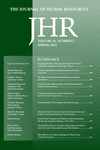Errors in Survey Reporting and Imputation and their Effects on Estimates of Food Stamp Program Participation
Abstract
Accurately measuring government benefit receipt in household surveys is necessary when studying disadvantaged populations and the programs that serve them. The Food Stamp Program is especially important given its size and recent growth. To validate survey reports, we use administrative data on participation in two states linked to the American Community Survey (ACS), the Current Population Survey (CPS), and the Survey of Income and Program Participation (SIPP). We find that 23 percent of true food stamp recipient households do not report receipt in the SIPP, 35 percent in the ACS, and fully 50 percent in the CPS. A substantial number of true non-recipients are also recorded as recipients, especially in the SIPP. We examine reasons for these errors including imputation, an important source of error. Both false negative and false positive reports vary with household characteristics, implying complicated biases in multivariate analyses, such as regressions. We then directly examine biases in common survey-based estimates of program receipt by comparing them to estimates from our combined administrative and survey data. We find that the survey estimates understate participation among single parents, non-whites, and low-income households, and also lead to errors in multiple program receipt, and time and age patterns of receipt.
- © 2020 by the Board of Regents of the University of Wisconsin System
This open access article is distributed under the terms of the CC-BY- NC-ND license (http://creativecommons.org/licenses/by-nc-nd/4.0) and is freely available online at: http://jhr.uwpress.org

